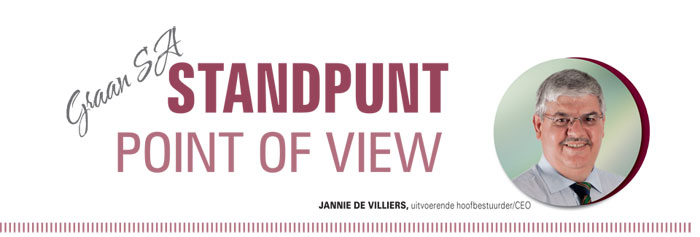May 2014

JANNIE DE VILLIERS, uitvoerende hoofbestuurder/CEO
The other day I was considering with what I had been occupying most of my time these last six months. I wanted to establish if I was still focusing on the right issues and where I delivered inputs to promote the best interests of the grain producer?
After Grain SA’s Congress the elected leadership will again have to take time out to sit under a tree to contemplate the road ahead. Where do we have to make adjustments and where do we have to break new ground to ensure crops for our children in the future?
Whilst politicians are busy with the canvassing for votes (and spending money) the officials are scurrying. Some are mortally afraid to make decisions because they might just lose their jobs should they now make a wrong decision, but then there are those who are creating absolute chaos to score points so that they might be promoted. It seems as if they are just brimming with confidence and have become so irrational that they are destroying bridges as if there will never be a day of tomorrow. How sad!
After 20 years, our young democracy has a new culture and a new understanding of what democracy means, but we also have an infrastructure which is crumbling and tottering (to zero) services by local governments. The list of problems and decay is very extensive, but like my now departed mother said: “A negotiated democracy is still better than a civil war.” We must therefore rather compare our current situation with a Mozambique or Angola than with the new South Africa.
A concept sticking in my mind is what someone the other day said in passing: That it is time for the country to move on to the real South Africa. The old South Africa was not acceptable, but the new South Africa is certainly also not acceptable. It is time to begin working on the real South Africa, where reasonableness, rationality and fairness are the norms and values. We are tired of corruption, inefficiency and weak excuses. I suspect that the result of the election will indeed cause a shift in policy. Which way, we do not know yet.
The whole issue of land reform will definitely be brought to a head in the next four years. This was already clear before the election campaigns kicked off. The solution to the problem, however, does not only lie at the government’s door and the time is long past where we can just criticise without coming up with suggestions ourselves. The fear of food shortages or high food prices can lead to interference in the market by the new administration.
In the process of working towards the real South Africa a number of things still have to happen where Grain SA launches private initiatives to make things work. I also see our black commercial grain producers having to play a larger role in our leadership to improve the agricultural environment.
The financing of production on communal lands is definitely a huge challenge which must be sorted out among the role-players. During the Grain SA Congress it was mentioned that some of our neighbouring African countries had already progressed further with this than we have. The new South Africa is busy falling behind in attracting new investments in agriculture. The risk for new investments in South Africa and the risk profile of the rest of Africa is narrowing. It is definitely going to influence investors.
I am thus dreaming of a real South Africa after the election where food security has such a high priority that land reform will be finalised in a rational manner and that the agricultural policy will be implemented efficiently to the advantage of all in the country.
Publication: May 2014
Section: Editorial
Author: JANNIE DE VILLIERS, uitvoerende hoofbestuurder/CEO